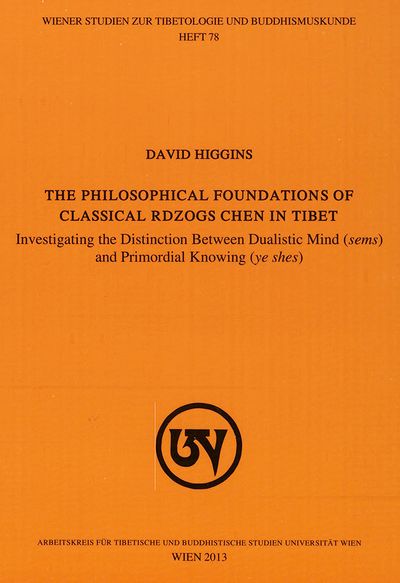- Contents5
- Prologue8
- Section One: Understanding the rDzogs chen Distinctions 17
- Part I Background18
- 1 Introduction: the Distinctions as a Window on Classical rDzogs chen18
- 1. Two Principal Distinctions: Sems/Ye shes and Kun gzhi/Chos sku18
- 2. The Place of the Distinctions in Classical rNying ma Soteriology24
- 3. The Disclosive Paradigm27
- 4. On the Obscure Origins of the sNying thig System30
- 5. The Lives and Works of Four Major rDzogs chen Figures35
- 5.1 Vimalamitra35
- 5.2 gNyags Jñānakumāra37
- 5.3 gNubs chen Sangs rgyas ye shes40
- 5.4 Klong chen rab ’byams43
- 6. Previous Studies and Scope of Present Work 53
- Part II The Problem of Knowledge: The Sems/Ye shes Distinction57
- 2 The Nature and Scope of the Mind/Primordial Knowing Distinction57
- 1. The Scope of the Distinction57
- 2. The rDzogs chen sNying thig Analysis of Mind (sems)66
- 2.1 Dualism67
- 2.2 Ignorance69
- 2.3 Reification74
- 3. The rDzogs chen sNying thig Analysis of Ye shes and
Related Concepts78
- 3.1 rDzogs chen Intepretations of Sems nyid79
- 3.2 rDzogs chen Interpretation of Rig pa and Rang rig86
- 3.3 rDzogs chen Interpretation of Ye shes99
- 4. Concluding Remarks: Reframing the Two Truths111
- 3 Classical Justifications of the Mind/Primordial Knowing Distinction120
- 1. Why the Distinction? 120
- 2. Some Consequences of Not Distinguishing Mind and Primordial
Knowing123
- 3. Criticisms of the Cessation of Jñāna Doctrine127
- 4. Clarifications and Transcendental Arguments133
- Part III The Problem of the Ground: The Kun gzhi/Chos sku Distinction140
- 4 The Ground in Early rDzogs chen (8th to 11th c.) 140
- 1. Background 140
- 2. Two Dimensions of the Ground Problem 142
- 3. The Yogācāra Model: Scope and Limitations 147
- 4. Toward a Primordially Unaffected Ground of Consciousnesss 150
- Ye shes sde’s Eighth Century Synthesis of Yogācāra and
Tathāgatagarbha Views 160
- 5. Conceptual History of the Ground in Early rDzogs chen 163
- 5.1 Soteriological Context of the Ground 163
- 5.2 A Typology of the Ground in early rDzogs chen 163
- (a) Ground as the Nature of Mind (sems nyid, ye shes, rig pa) 168
- (b) Ground as the Nature of Reality (de bzhin nyid, de kho na
nyid, chos nyid)170
- (c) Ground as Buddha Nature (bde gshegs snying po, byang
chub snying po) 173
- 5 Distinguishing the sNying thig Ground of Freedom (grol gzhi)183
- 1. Stages of Differentiating the Sūtric and rDzogs chen Grounds 183
- 1.1 Identity: Ground as Common Source of Saṃsāra and Nirvāṇa 185
- 1.2 Divergence: Conflicting Interpretations of Kun Gzhi189
- 1.3 Difference: Clearly Distinguishing the Grounds 192
- 2. A Central Problem: Does Errancy Exist in The Ground? 198
- 2.1 The Response of gNyags Jñānakumāra (8th Century) 199
- 2.2 The Response of Rog Bande Shes rab ’od (12th Century) 201
- 2.3 The Response of Klong chen rab ’byams pa (14th Century) 203
- 3. The sNying thig Primordial Ground and its Critics206
- 3.1 The Abiding versus Metaphysical Grounds207
- 3.2 Mi bskyod rdo rje’s Critique and rNying ma Responses213
- 4. Concluding Remarks: The rDzogs chen Idea of Freedom217
- Part IV The Problem of the Path: Implications of the Sems/Ye shes
Distinction222
- 6 rNying ma Path Hermeneutics and the Problem of Reconciliation 222
- 1. Overview: Bridging the Vehicles226
- 2. The Problem of Gradualism in rNying ma Perspective229
- 3. Nature and Scope of the Reconciliation Problem231
- 3.1 The Exegetical Dimension: Doctrinal Synthesis and Narrative
Unity251
- Comparison with gSar ma Path Summaries of Atiśa,
sGam po pa, Tsong kha pa257
- 3.2 The Hermeneutical Dimension: Intemalizing the Path245
- 4. rNying ma Soteriological Schemes: From Soteriology to
Aletheiology249
- 4.1 The Path as Emancipation Process and Clearing Process249
- 4.2 Yon tan rgya mtsho on Disciplines (sdom) as Stages of
Refinement255
- 7 rDzogs chen Transformations of the Path 255
- 1. The rDzogs chen Path Without Progression
(bgrod du med pa'i lam)255
- 2. Where the Ladder Ends: A Path Beyond Its Representations 264
- Section Two: Tibetan Texts and Translations267
- 1. Klong chen pa’s Sems dang ye shes kyi dris lan268
- 1.1 Introductory Remarks268
- 1.2 Translation: A Reply to Questions Concerning Mind and
Primordial Knowing269
- 1.3 Sources and Conventions Used in Preparing Critical Edition289
- 1.4 A Critical Edition of Sems dang ye shes kyi dris lan290
- 2. Klong chen pa’s Theg mchog mdzod (excerpts)500
- 2.1 Introductory Remarks500
- 2.2 Translation: Treasury of the Supreme Vehicle (excerpts)501
- 2.3 Sources and Conventions Used in Preparing Edited Text515
- 2.4 Edited Text of Theg mchog mdzod XIV (excerpts)516
- 3. ’Jigs med gling pa’s Yon tan mdzod XII.9-13 with Yon tan rgya mtsho’s
Commentary527
- 3.1 Introductory Remarks527
- 3.2 Translation: Treasury of Qualities XII.9-23 with Commentary
(excerpts)527
- 3.3 Sources and Conventions Used in Preparing Edited Text555
- 3.4 Edited Text of Yon tan mdzod XII.9-13 and Commentary555
- Bibliography and Abbreviations541
- Index560
The book consists of two parts: (1) a detailed philosophical investigation of the distinctions and (2) an anthology of previously untranslated Tibetan materials on the distinctions accompanied by critical editions and introductions. The first part systematically investigates the nature and scope of the distinctions and traces how they developed in relation, and sometimes reaction, to Indian Buddhist
Cittamātra, Madhyamaka, Pramāṇavāda, and Vajrayāna views. It concludes with an exploration of some soteriological implications of the mind/primordial knowing distinction that became central to rDzogs chen path hermeneutics in the classical period as authors of rDzogs chen path summaries used this distinction to reconcile progressivist sūtric and non-progressivist tantric models of the Buddhist path. The translations and texts included in part two of the book consist of (a) a short treatise from Klong chen pa’s Miscellaneous Writings entitled
Sems dang ye shes kyi dris lan (
Reply to Questions Concerning Mind and Primordial Knowing), (b) selected passages on the distinctions from this author’s monumental summary of the rDzogs chen sNying thig (Heart-essence) system, the
Theg mchog mdzod (
Treasury of the Supreme Vehicle), and (c) an excerpt on rDzogs chen distinctions taken from ’Jigs med gling pa’s (1729-1798) 18th century Klong chen sNying thig path summary entitled
Treasury of Qualities (
Yon tan mdzod) along with a word-by-word commentary by Yon tan rgya mtsho (b. 19th c.). (Source:
WSTB)
- klong chen pa. sems dang ye shes kyi dris lan. In gsung 'bum dri med 'od zer, Vol. 24: 407-419. Pe cin: krung go'i bod rig pa dpe skrun khang, 2009.

- _______. theg mchog mdzod, Excerpts from Chapter 14. In gsung 'bum dri med 'od zer, Vol. 17: 504-589. Pe cin: krung go'i bod rig pa dpe skrun khang, 2009.

- 'jigs med gling pa. yon tan mdzod, Excerpts from Chapter 12. In gsung 'bum 'jigs med gling pa, Vol. 2: 101-107. Gangtok, sonam topgay kazi, 1970-1975.

- Dge mang mkhan chen yon tan rgya mtsho. zab don snang byed nyi ma'i 'od zer. In yon tan rin po che'i mdzod kyi 'grel pa zla ba'i sgron me dang nyi ma'i 'od zer, Vol. 2. Gangtok, sonam topgay kazi, 1969-1971.



